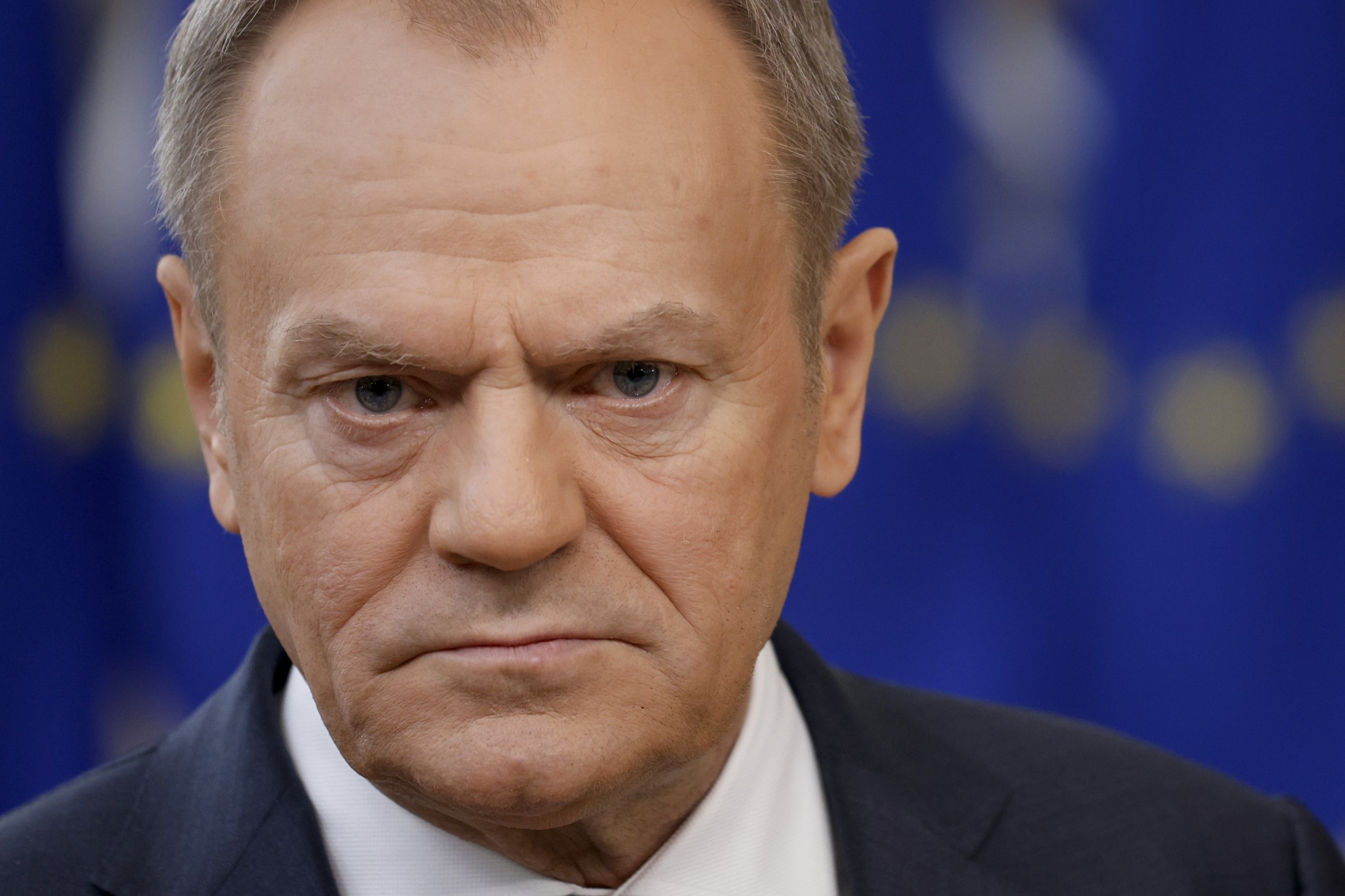Republished via Sovereignty.pl.
The first month after taking power was no honeymoon for Donald Tusk’s government. There is already growing criticism within its own camp, both from those who are stunned by his heavy-handed and blatantly unlawful approach to “restoring” democracy and the rule of law after eight years of whining in Brussels on this very issue, and from those on the far left who find him insufficiently radical.
“After October 15, I began to speak more to those in power now than to their predecessors or about them. Maybe such is a lawyer’s soul that the rule of law, which has been talked about so much all these years, is really a very personal matter for us lawyers,” says Professor Marcin Matczak.
This expert in constitutional law has recently become one of the loudest critics of the methods employed by the left-liberal government sworn in on Dec. 13.
[pp id=106054]
First Matczak warned against entrusting education to Donald Tusk’s strongly leftist New Left coalition partner, then he protested against the exclusion of nearly 8 million PiS voters from the public discourse, and finally he spoke out on the highly questionable legal changes to the public media and the judiciary [with the justice minister’s decision to remove the national prosecutor without the president’s necessary approval, and to remove many lower-ranking prosecutors without the approval of the legitimate national prosecutor, ed.].
However, let no one be under any illusion: This professor of constitutional law from Warsaw University has not suddenly become a supporter of Jarosław Kaczyński’s Law and Justice (PiS) party. He simply recognizes the ruthlessness that characterizes the actions of this “October 15 coalition” government.
“Producing legal dualism, a legal chaos where ordinary people don’t know who to listen to, was Law and Justice’s goal from the very beginning. In such a situation, the law was to cease to matter. It was to be replaced by the will of Jarosław Kaczyński, to whom people disappointed with the law would come like to Don Corleone, and he would dispense justice while stroking his cat.”
Such are the words used by Professor Matczak to criticize Donald Tusk’s predecessors. It does not prevent him, however, from seeing the dangers linked to the current government.
“My favorite text is an article by Martin Krygier, who is one of the world’s best experts on the rule of law […]. There he speaks of fear, humiliation, happiness, and the realization of one’s plans. He says the rule of law has one purpose: to limit the arbitrariness of power, so that power doesn’t get into our heads, into our homes, and into our beds, so that it doesn’t feel that it is omnipotent. According to him, ‘the rule of law reduces fear and humiliation and it fosters dignity.’ Therefore, why should I speak to the new opposition when it no longer threatens people in these areas so much? However, every power is a threat,” Matczak explained when interviewed by journalist and author Igor Janke.
[pp id=106383]
During that interview, Matczak described another rather obvious scenario in which the Tusk government would not have to transgress the law to achieve its goals: “It may be necessary to wait until Andrzej Duda leaves the Presidential Palace to remove legal dualism,” he said. Such a balanced approach did not please the most hardline members of the new governing coalition, and this is particularly true of another lawyer, Roman Giertych, who has been entrusted by Donald Tusk with the mission of bringing to account those who might have broken the law under PiS rule.
A Machiavellian plan
The unlawful methods used by the left-liberal coalition are also recognized by Professor Antoni Dudek, a well-known and respected historian and political scientist in Poland (see here our recent interview with Antoni Dudek about the situation of the Right in Poland after Donald Tusk’s takeover of the public media).
For years, Dudek has had bitter words for PiS. However, this political scientist from Cardinal Stefan Wyszyński University notes that “we cannot start repairing the state by using methods that are, in fact, completely unconstitutional. If anyone has been making a comedy of the Polish Constitution since Oct. 15, it is Donald Tusk’s team,” he opined in an interview with the Wirtualna Polska website.
Dudek mocks the “constitutional occultism spreading in Poland.” saying: “I hear with dismay various lawyers who have no argument to justify the [anti-PiS] cordon sanitaire coalition’s actions concerning the public media and a few other areas. When the letter of the law does not allow something, the spirit of the constitution allegedly does,” he notes.
The unprecedented arrest of MPs Mariusz Kamiński and Maciej Wąsik at the Presidential Palace on Jan. 9 triggered a wave of criticism against Donald Tusk (though government supporters were delighted). The PiS-led United Right camp accused the authorities of making the two former ministers political prisoners.
There are also voices not so much asserting the innocence and honesty of the former ministers as questioning the way the detention was carried out.
Former diplomat Witold Jurasz, who usually disagrees with Law and Justice on most issues, noted that Jarosław Kaczyński’s party was waiting for its “martyrs,” saying, “One can, of course, consider that the new authorities are carrying out some Machiavellian design, the essence of which is to act strongly and without a precise plan in order to push the Law and Justice party into chaos and to a radicalization that is already taking place, so as to make it look like a gathering of lunatics. It is increasingly difficult, however, to believe in the existence of such a Machiavellian design. Instead, it increasingly seems that we are dealing with an Olsen Gang-style plan. Except that if Polish politics were to become a battleground for lunatics and the Olsen Gang, all that remains is to hope that Uncle Sam will protect us,” Jurasz argues.
He also has harsh criticism for Justice Minister Adam Bodnar’s attitude in the context of relations with the United States.
“I am pleased that Ambassador Mark Brzezinski positively assesses the ministry’s actions leading to the restoration of the rule of law in Poland,” Bodnar said after meeting Brzezinski. “Traditionally, ambassadors would avoid expressing judgments on domestic affairs in their host country. This somewhat conservative principle of diplomacy has undergone far-reaching modification in recent years, though, and today ambassadors allow themselves to make statements that would have been considered inappropriate a decade or so ago. What has not changed, however, and what Bodnar apparently does not understand, is that a member of the government of a country that has self-esteem should never publicly ’rejoice’ when praised by another country’s ambassador,” the former diplomat argues.
“Perhaps it would be good for the rules of relations with ambassadors to be explained to Minister Bodnar by Foreign Minister Radosław Sikorski, who a few years ago rightly pointed out the excessive tendency of Polish politicians to, as he put it, ’give a blow job’ to the United States,” Witold Jurasz says, referring to Sikorski’s infamous comment. The problem is not only the Tusk government’s ruthless methods, but also its radical deference to foreign partners.
When a politician calls a journalist
The new incarnation of Polish public television (TVP) was supposed to be — in the words of Marek Czyż, the star presenter of the new “19:30” evening news service — like clear water. Viewers were supposed to get a “photograph” of the world instead of a manipulated picture. They were to get to know different views on a given topic so that they could form their own opinion.
Is this really the case? Well, not according to Waldemar Kuczyński, an economist, journalist, and political commentator who for years has described himself as an “enemy of PiS.”
“I’m watching the report about the project for Poland’s CPK central airport [which has been criticized for years by Donald Tusk and his political friends] on TVP Info and I’m outraged by the way it’s conducted. They talk remotely to an important expert who is in favor of this project, and the presenter interrupts this interview at a crucial moment, as if on purpose. The news report does not look like an objective analysis of the problem,” Kuczyński noted. “I’m not an opponent, but an enemy of PiS, I have zero confidence in their words. I see their pretentious announcements, including economic ones, as nationalist rhetoric. I look at the CPK project with distrust, but not with radicalism,” Kuczyński added.
An interesting review of what the new TVP looks like comes from journalists who by no means praised the public media’s performance under the previous government.
“The new TVP has tried to attract people from almost all our editorial offices, and in some cases they succeeded. They offered very big money – often rates that have little to do with the market situation,” Bartosz Węglarczyk, editor-in-chief of Onet.pl, said in December. “Isn’t it the case that the new government saw that TVP was working well as a propaganda tool and decided that it simply had to be preserved?” he asked.
Onet.pl has always been more favorable to the liberal camp, but long-time Onet.pl journalist Magdalena Rigamonti openly admits that the only thing that has changed in the public media is who now exerts an influence on it.
“An interview with Janusz Zaorski, who was chairman of public radio and television from 1992 to 1993, is to be published on Onet.pl. At the time, every minister wanted a program. Not much has changed. For eight years [of PiS rule] politicians decided what TVP looked like, and I have the feeling that politicians will also decide now,” Rigamonti says.
Rigamonti has revealed that the private media journalists who have been offered jobs in the public media after the latter’s forceful takeover by the Tusk government “were not called by fellow journalists, but by politicians.” Those politicians are said to have offered them the task of “building free media.”
“If a politician calls a journalist, that should raise alarm bells, because it means that they don’t plan to have free media, only government media, and that’s a big worry we should be talking about,” the Onet.pl journalist concluded.
Onet Deputy Editor-in-Chief Andrzej Stankiewicz points out that the public media takeover “was terrible shit” and could have looked different.
“It seems to me that it could have been done without the bitter scenes, without the pushing and shoving and without the protests,” he said. “Everyone could see the images of the pushing and shoving, and I just happened to turn on TVP Info when the signal went off. Is this normal? The new government had its people inside the old TVP team, some renegades who helped their people to enter, who opened the gates. It looked terrible,” the journalist concluded.
Filip Chajzer, a former star reporter and presenter at the private [left-liberal and vehemently anti-PiS] TVN channel, does not believe in the objectivity of the new TVP: “I don’t like extremes. As much as I didn’t like the extreme narrative so far, I was hoping for balance, that TVP would become normal and cool. Meanwhile, I am now served extreme narrative in the opposite direction, which I find unpleasant. One side behaved in a certain way, and the other side has now decided to take revenge. Before, I would watch [TVN’s news service] Fakty and [TVP’s news service] Wiadomości to form my own opinion. Now, I’m afraid, I’ll get Fakty twice,” Chajzer notes bitterly.
More radicalism
On the other hand, among the disappointed there are also those who expect more radicalism from Donald Tusk’s left-liberal coalition. One of the most glaring examples is the issue of abortion.
The head of the pro-abortion organization FEDERA has appealed to Prime Minister Donald Tusk to liberalize Polish law. “We are pleased that in the election campaign an important commitment of the Prime Minister was to guarantee access to abortion within the national health care system. Mr. Prime Minister, we have heard the promises, it is time for those now in power to keep their word,” wrote Krystyna Kacpura.
The activist pointed out that “it is 31 years since the law limiting access to abortion in Poland went into effect… This is an infamous anniversary that reminds women that the right to decide on our bodies and lives was taken away from us by a top-down decision of the Polish Sejm. There is a reason why the current law is seen by the public as an anti-abortion law,” she notes. And she adds that “women living in Poland must have systemically guaranteed access to safe, legal and free abortion.” Preferably immediately, of course.
In addition to Tusk’s perceived passivity on abortion, the left side of public opinion is showing disappointment over illegal immigrants. It was expected that the PO-led government would put into practice the naive and dangerous demands expressed in Agnieszka Holland’s Green Border.
Meanwhile, as announced by Maciej Duszczyk, secretary of state at the Ministry of Interior for immigration policy, pushbacks at the eastern border will continue. Duszczyk says that Poland’s security is a priority.
“It seems to me that the new authorities are trying to soften the message a bit regarding the Polish–Belarusian border, for example by using the word ‘turnback’ rather than ‘pushback.’ Evidence of some change in attitude is also seen in the fact that, as we recently reported, the Border Guard accepted for the first time our appeal against an illegal pushback and admitted that it did indeed take place illegally. That’s something new. It’s all the more reason, however, to watch the new government closely, so that we are not misled by this softened message,” alerts Marta Górczyńska, a lawyer from the Helsinki Foundation for Human Rights.
Magdalena Chrzonowicz, deputy editor of the strongly leftist OKO.press website, is among those demanding more decisive action from the Tusk government. “Donald Tusk admits that pushbacks are illegal, but the government’s priority is to defend the border. ‘I am speaking softly, but you understand my intentions.’ We understand the message: the government will not ban pushbacks. At most, it will send instructions to the Border Guard to spare the weakest. It’s not enough. NGOs and humanitarian organizations had hoped that after the change of government, the authorization of deportations in Polish law (while they remain illegal in international law) would be revoked. The Ombudsman has also called for this on several occasions,” Chrzonowicz notes.
This article was first published in Polish in the Do Rzeczy weekly in January 2024.





